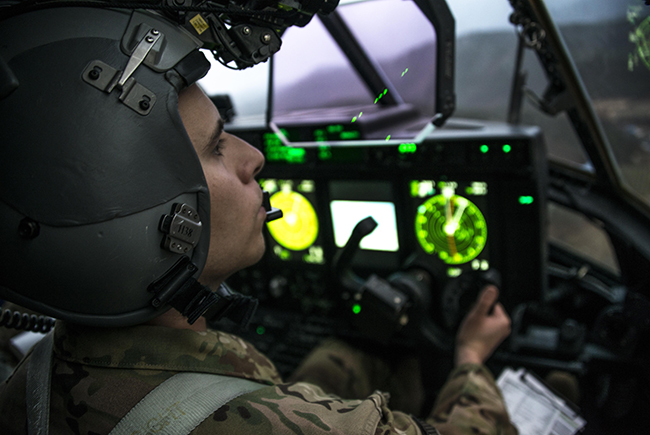
An Air Force 17th Special Operations Squadron pilot flies the MC-130J Commando II during low-level operations through mountainous terrain on the Republic of Korea peninsula, on April 1, 2017. Throughout Foal Eagle 2017, the 1st SOS and 17th SOS provided specialized aviation to members of the ROK Air Force 255th SOS, ROK Special Warfare Command, US Marine Corps III Marine Expeditionary Force and US Air Force 320th Special Tactics Squadron. Air Force photo by Capt. Jessica Tait.
While the US has made large-scale changes to its joint exercise schedule with South Korea to help diplomatic efforts with North Korea, the Kim Jong Un regime has continued a “slate of full spectrum” training, the head of US Forces Korea said Wednesday.
Army Gen. Robert Abrams told the House Armed Services Committee there has been “little to no verifiable change” in North Korean military posture, and its military activity has been “inconsistent” with denuclearization efforts.
The US military has canceled large-scale exercises such as Foal Eagle, Ulchi Freedom Guardian, and Key Resolve even though he second summit between President Donald Trump and Kim ended abruptly in late February with little progress made. Following the summit, Trump told reporters he canceled the exercises “because it costs us $100 million every time we do it. … We spent hundreds of millions of dollars on those exercises and I hated to see it. I thought it was unfair.”
When asked about the potential cost savings from canceling the large exercises, Randall Schriver, the assistant secretary of defense for Asian and Pacific security affairs, said the US is still determining what savings there could be.
“I’m not aware we have a plan for what to do” and how that money could be used, he said.
Abrams said that even though the US has changed the “size, scope, volume, and timing” of its training, North Korea has continued with its ongoing winter training cycle at “historic norms.”
Schriver told the committee that “on our core area of interest and concern, the issue of denuclearization, we have not seen any progress to speak of.”
The continued readiness of North Korean military forces “continue to hold the United States, South Korea, and our regional allies at risk. As such, I believe it is necessary to maintain a postured and ready force to deter any possible aggressive actions,” Abrams said.
USFK is still conducting smaller joint training at lower levels. As of last week, there have been 82 combined South Korea and US training exercises “at appropriate echelons” since November, Abrams said. The two militaries are working “hand in glove” and “we are a trained and capable force,” he added.